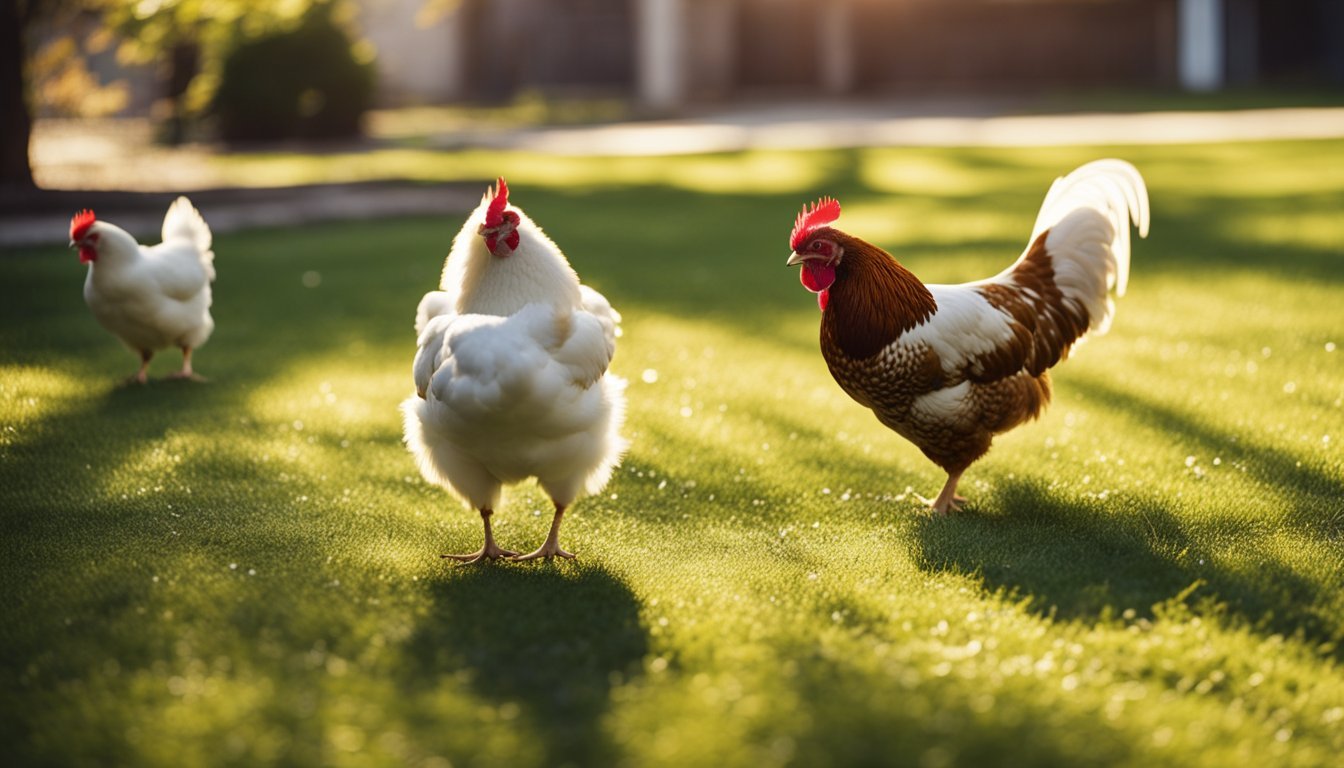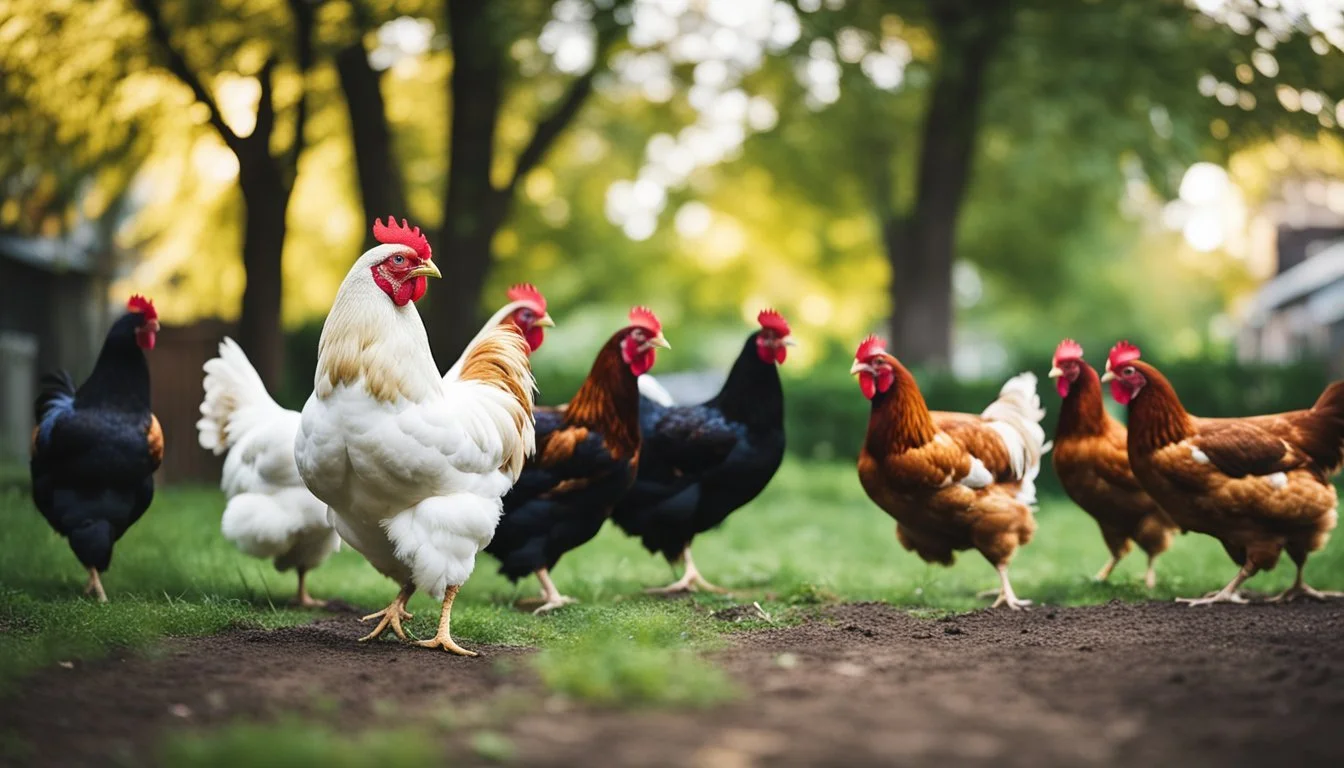5 Benefits of Free-Ranging Your Urban Chickens
Enhanced Health and Happiness
Raising chickens in urban environments is becoming increasingly popular, and many city dwellers are exploring the practice of free-ranging their feathered friends. Free-ranging refers to allowing chickens to roam outside the confines of a coop, typically within a fenced yard or open space where they can forage and explore. This method not only provides numerous benefits to the birds' overall well-being but also enhances the quality of life for both chickens and their keepers.
As urban landscapes continue to expand, integrating sustainable practices like free-ranging chickens can have a positive impact on the ecosystem. By understanding the advantages of free-ranging, urban chicken enthusiasts can make informed decisions that lead to healthier and more content chickens.
1) Enhanced Egg Quality
Free-ranging chickens enjoy a varied diet that includes plants, bugs, and grains.
This diverse diet contributes to eggs with richer, more vibrant yolks. The increased outdoor activity also results in thicker eggshells.
Many find that free-range eggs have a more pleasing texture and flavor compared to those from confined chickens.
The natural diet and exercise contribute to eggs with fewer cholesterol and saturated fats.
These eggs often contain higher levels of vitamin A, omega-3 fatty acids, vitamin E, and beta-carotene.
Beyond nutritional benefits, free-range eggs are visually appealing and more enjoyable to cook with.
2) Improved Physical Health
Free-ranging urban chickens have the opportunity to engage in various physical activities that boost their health. As they roam, they can exercise their muscles, leading to leaner and stronger bodies.
Access to a diverse environment allows chickens to forage for natural diet components, such as insects and plants. This diet variation contributes to better nutrition and overall physical wellness.
In addition, the movement and exercise reduce the risk of obesity and related health issues. Chickens that are less confined tend to be less prone to ailments like fatty liver disease and heart issues.
The increased physical activity also promotes better bone health. Chickens have stronger bones and joints when they're allowed to move freely in a larger space compared to those confined to small coops.
3) Natural Disease Prevention
Free-ranging urban chickens can experience fewer diseases due to their ability to access diverse environments. Exposure to fresh air and sunlight helps to boost their immune systems. This can make them less susceptible to common poultry diseases.
Foraging behaviors, such as pecking at natural grasses and insects, provide a more varied diet. This can contribute to better overall health. A balanced diet from natural sources helps strengthen their immune responses.
Movement in open spaces allows chickens to avoid the concentration of pathogens often found in confined areas. Free-ranging reduces the risk of disease transmission through overcrowded conditions. Chickens naturally spread out and are less likely to come into contact with each other's droppings.
Dust baths in outdoor settings help chickens clean their feathers and skin. This natural behavior can reduce the presence of parasites. Dust baths also provide an enjoyable way for chickens to maintain their hygiene, further preventing disease.
Providing opportunities for natural behaviors and a varied environment supports healthier, more disease-resistant chickens. Allowing chickens to free-range in urban settings can be a simple yet effective way to promote their wellbeing.
4) Reduced Feed Costs
Free-ranging urban chickens can significantly lower feed costs. When chickens forage, they consume bugs, grass, seeds, and leaves that they find. This natural diet reduces the amount of commercial feed required.
In addition to saving on feed, foraging also provides chickens with a diverse diet, improving their health. Healthy chickens are often more productive, potentially increasing egg output.
Free-ranging allows chickens to find essential nutrients in their environment. This practice can lead to lower veterinary expenses due to better overall health. Consequently, reduced feed costs and improved health make free-ranging beneficial for urban chicken keepers.
5) Better Mental Stimulation
Free-ranging chickens experience a richer environment compared to being confined. They engage in natural behaviors like foraging, dust bathing, and exploring. These activities keep their minds active and reduce boredom.
Chickens that roam freely interact more with their surroundings. They peck at insects, scratch the ground, and discover new areas. This exploration provides constant mental challenges and stimulation.
A varied environment promotes problem-solving skills. Free-ranging chickens need to navigate obstacles and search for food. These tasks enhance their cognitive functions and keep them alert.
Interaction with other chickens also improves mental health. They can establish social hierarchies and engage in playful activities. This social interaction is crucial for their overall well-being and mental sharpness.
Understanding Free-Ranging for Urban Chickens
Free-ranging urban chickens offers distinct advantages, such as improved health through foraging and natural pest control. It also presents specific challenges like safety and space requirements.
Definition and Overview
Free-ranging refers to letting chickens roam outside their pen and coop. In urban settings, this often means a fenced yard where chickens roam during part or all of the day.
The practice improves their diet with a variety of plants and insects. Chickens benefit from added exercise and mental stimulation.
Urban environments pose unique challenges. Predators, limited space, and regulations may affect how and when chickens can be free-ranged. Proper planning ensures these conditions are met to provide a safe and enriching environment.
Common Misconceptions
A prevalent myth is that urban spaces are unsuitable for free-ranging chickens. While adjustments are needed, many urban areas allow for secure and productive free-ranging with the right setup.
Another misconception is that free-ranging always leads to frequent health issues. On the contrary, with proper management like regular health checks and safe roaming areas, chickens can thrive.
Misunderstandings about local regulations also exist. Local authorities often have guidelines that need to be followed, so research and compliance are crucial.
Proper fencing and predator deterrents are important aspects to mitigate risks, ensuring chickens can enjoy the benefits of free-ranging safely.
Health Benefits of Free-Ranging
Free-ranging has several health benefits for urban chickens, impacting both their physical activity and nutrition intake. The freedom to move about and forage promotes a healthier and more dynamic lifestyle.
Improved Nutrition
Free-ranging chickens have access to a diverse diet, beyond what commercial feed offers. When chickens roam freely, they consume insects, different plants, and even small animals. This varied diet enhances the nutritional profile of their eggs.
Eggs from these chickens often contain higher levels of omega-3 fatty acids and vitamin E.
Additionally, free-ranging can reduce the amount of supplement feed required. Chickens can find natural sources of grit, essential for digestion. Access to fresh forage ensures they get enough vitamins and minerals, contributing to stronger immune systems and lower disease rates.
Increased Physical Activity
Physical activity is crucial for keeping chickens healthy. Free-ranging allows them to engage in natural behaviors such as scratching, pecking, and dust bathing. These activities not only keep them entertained but also boost their physical fitness.
Regular movement can help prevent obesity and related health issues. Physical activity is essential for muscle development and joint health. Active chickens are generally happier and more productive, laying more eggs over their lifetime.
In urban settings, where space might be limited, ensuring your chickens have time to roam can lead to significant health improvements.







